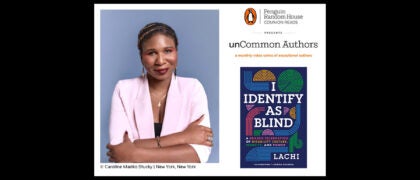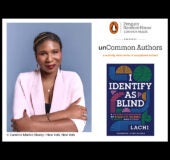The book is based on your popular class Life Worth Living at Yale. What do you want readers to take away from the book?
Five things stand out to us:
- We want readers to have a deep conviction that the question of what makes life most worth living matters and confidence that they have what it takes to ask that question.
- We want readers to know that there are lots of helpful voices out there from all throughout history and all over the world who can help us ask the question well and respond to it honestly.
- We want readers to learn some habits of reflection that they can rely on in the future, so when this question comes up in new ways, they know how to approach it.
- We want readers to see that it’s best to pursue this question in community with others.
- Maybe most basically of all, we want readers to trust and to feel in their gut that their lives are deeply valuable and truly worth not just living but living well.
How did the class come about and evolve into this book? Has the course been taught outside of Yale and, if so, where and how was it received?
RM: Miroslav saw an opportunity to bring these deeply important questions about meaning and purpose and value into the classroom at Yale. The idea was to help students wrestle with these questions in their own lives. I was a grad student at the time, but I instantly fell in love with the idea and managed to convince Miroslav (and the Yale administration) to let me teach the class with him.
MV: When Ryan and I first designed the class, we didn’t know quite how well it would land with students. We got a hint when the seminar room was overflowing on the first day and students who wanted to take the class were lining the hallway outside. Since then the class at Yale has grown to eight seminar sections a year that can accommodate up to 120 students. For a long time, we’ve wanted to offer what we’ve learned by teaching Life Worth Living to the great majority of people who aren’t currently college students. The book grew naturally out of that desire.
MC: We’ve taught Life Worth Living in retreat formats and as community courses, and I even had the privilege to teach a version at a federal penitentiary. We’ve also wound up gathering a wonderful network of colleagues at other colleges and universities who have adapted Life Worth Living for their campuses. Those include the University of Hong Kong, The University of Sheffield in the UK, Duke University, Colby College, the University of South Florida, West Chester University in Pennsylvania, and others. This book is the next step.
You’re part of the Center for Faith & Culture at Yale Divinity School. Is the book religious or secular in nature?
MV: The questions we consider in the book are fundamental human questions. They go deeper than any divide between religious and secular or between sacred and profane. Religious traditions and secular philosophies differ in the answers they give to these questions. They differ even in the way the pose these questions. But they all grapple with them. Each of us, in our own unique way, grapples with them.
RM: Miroslav, Matt, and I each have our own (Christian) responses to these questions. We try our best to live those responses out, and we love to talk with people about them. But that’s not what this book is for. Precisely as Christians, we think it’s important to offer anyone who wants it a toolkit for thinking well about life’s most important questions.
MC: Our colleagues who teach Life Worth Living come from all sorts of religious and non-religious perspectives, and so do the students who take the class. In our experience, it’s really enriching to pursue the question of what matters most together with people we don’t agree with. The book offers that same approach by presenting lots of different perspectives for readers to engage with.
Throughout the book you refer to “the Question”. What does “the Question” represent? Why isn’t it clearly defined? Would you say “how do I live a flourishing life” comes close?
We talk about “the Question” to underscore that the kind of question we’re inviting you to propose isn’t just hard to answer—it’s hard to ask well, too. The more time you spend with it, the more you realize that no matter how you phrase the Question, there’s something not quite right. Let’s say you ask, “What is the good life?” Well, are you sure there’s only one shape to a good life? Similarly, “How do I live a flourishing life?” is a pretty good swing at it, but it’s open to a couple of potentially serious confusions.
First, the Question isn’t just a how question. It’s not like we all already know what it means to flourish and we’re just trying to figure out whether the best way to get there is to take the train or drive on the highway. Second, that way of putting it risks reducing the Question to something that’s all about me. Are you sure that’s the right unit of analysis? What about us? What about the planet? By choosing this way of putting the question, you’ve prejudged some important parts of your answer.
So our strategy is to talk about “the Question” and let’s communicate just how expansive the issue is: it’s about worth, value, good and bad and evil, meaning, purpose, final aims and ends, beauty, truth, justice, what we owe one another, what the world is and who we are and how we live. That’s a lot. So our next step is to break this really big, hard to articulate Question down into smaller, more definable subquestions that let us get some traction and start to think well about it.
How do we respond and what should we do when we fail to live up to our own standards?
RM: I think too often we respond with denial or paralyzing shame. We need deeper visions of lives worth living to move beyond these reflexes.
MC: But how it makes sense to move beyond them depends on what you believe about the nature of right and wrong and how human relationships work and what it means to be a responsible self. Life Worth Living is offering a starting point to help readers start to get their own best responses to these questions.
MV: Most of the ways of responding to failure that have had staying power do two seemingly opposed things simultaneously: they normalize failure and show why and how we should take it seriously so as to grow into fuller, richer way of being human. To fail is human, and to become a better human as a result is more so.
What are some of the disciplines and practices for pursuing the Good Life?
RM: Well, what disciplines and practices make sense depend on what your vision of the good life is. For example, the daily Muslim prayers called salat don’t make a lot of sense as a discipline if you don’t believe in God. That said, what seems clear enough to me is that it’s not enough to just have an intellectual vision of the good life. It’s not even enough to really want to live the good life. Some sort of embodied, repeated practices are going to be essential. But they’ll need to fit your vision.
MC: And I would highlight that many of the best disciplines and practices like that happen in community. Pursuit of the good life goes best when it’s a common pursuit.
MV: That seems right to me. I would add, however, that there are disciplines and practices for the search. What I mean is, there are stances we can take and habits we can develop that help us stay in touch with the Question in the midst of our often busy lives, help us think and imagine well, and help us prioritize what we come to believe matters most. These can be things like cultivating curiosity, meditating or praying, or going back again and again to books or works of art that pull us into the Question and have helped orient us in our lives so far.
What next steps do you recommend to readers when they’ve finished the book/class?
The ordinary churn of life tends to suck us in and pull us away from attention to the question of what matters most. So our basic encouragement to readers and students is to stick with it. If you can, add some rhythms to your life that carve out time for reflecting on and reconnecting with what matters most. If you’ve come to important insights while reading the book, take steps to live them out. (We have students who start practicing sabbath rest, for example, or start giving regularly to Effective Altruist causes or join a meditation practice.) Don’t let go of the insight. Live it as best you can.
These sort of things can be really lonely if you’re on your own, so another recommendation is to start conversations. Talk with friends about what you’re thinking. Ask them how they respond when they fail to meet their own standards, what they think it means to lead a good life, who they see themselves as responsible to. If you can find an opportunity, talk with people who are unlike you in important ways. While nothing could be more personal than our own visions of what matters most, privatizing the Question is a good way to sideline it. The best way to make this vital reflection part of your life is for it to be part of our lives together.
Learn more about the Life Worth Living course here





